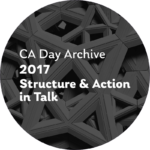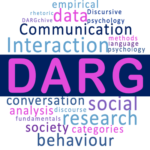
Recorded 18th December 2017. Elizabeth’s presentation focuses on the visual gestural practices which signers use to achieve and maintain mutual…

Recorded 18th December 2017. Elizabeth’s presentation focuses on the visual gestural practices which signers use to achieve and maintain mutual…

Recorded 18th December 2017. Gareth explores the variety of ways that researchers have represented acoustic data in their work. He…

Recorded 19th December 2016. In his talk, Kurt analyzes how and where patients request prescription medications from their GPs in…

Recorded 19th December 2016. Saul and Patrick take one specific kind of assessment — retro-sequential assessments — and investigate how…

Recorded 19th December 2016. In their presentation, Christian, Stuart, and Mark present early findings of their study of correction sequences…

Recorded 19th December 2016. In her talk, Lorenza investigates mobile interactions — specifically between walking interactants —and the role mobility…

Recorded 19th December 2016. In their talk, Ariel Vázquez Carranza and Rebecca Clift share their preliminary observations on the ‘open…

Recorded 19th December 2016. In this technical talk, Christoph argues for using XML — a data format already available in…

Recorded 19th December 2016. In this snapshot of her Ph.D. project, Qi Chen analyzes speaker transitions in multi-party group project…

In this episode, Elliott Hoey (Vrije Universiteit Amsterdam) interviews Lorenza Mondada, professor of linguistics at the University of Basel. Professor Mondada is now the world’s foremost authority on the analysis of video recorded social interactions, especially as regards the interplay of multimodal resources for the constitution of everyday and institutional activities. In recent work, she has examined in a series of papers the interpenetration of talk and ambulatory movement, she recently edited a volume on touch in social interaction, and coming out this summer is a monograph entitled Sensing in social interaction. Among many other sites, Lorenza has recorded in wine and cheese shops all over Europe, as well as bakeries and butcheries, in train depots and border crossing stations, art museums and garden tours, and documented activities from dumpster diving to fine dining. Given this truly remarkable breadth of fieldwork, she was the perfect person to talk to about data collection.